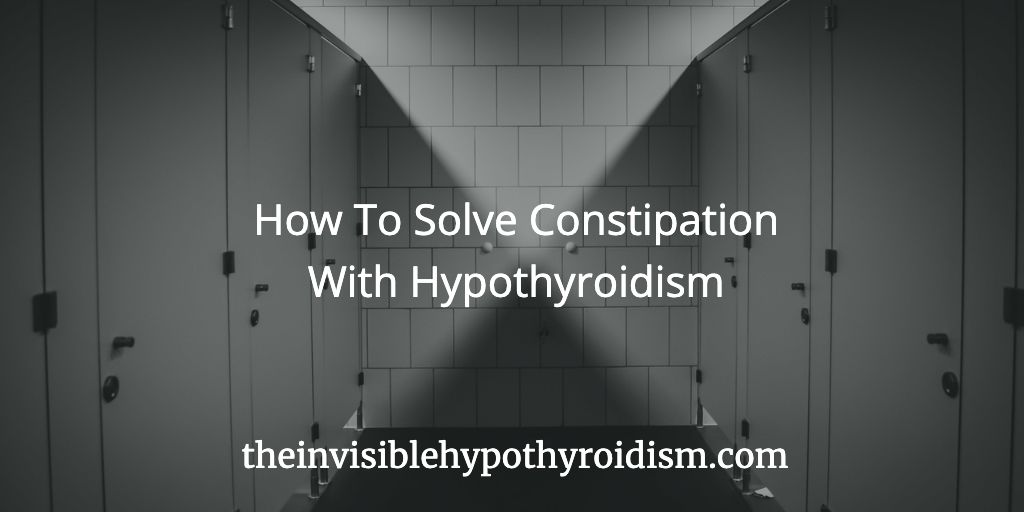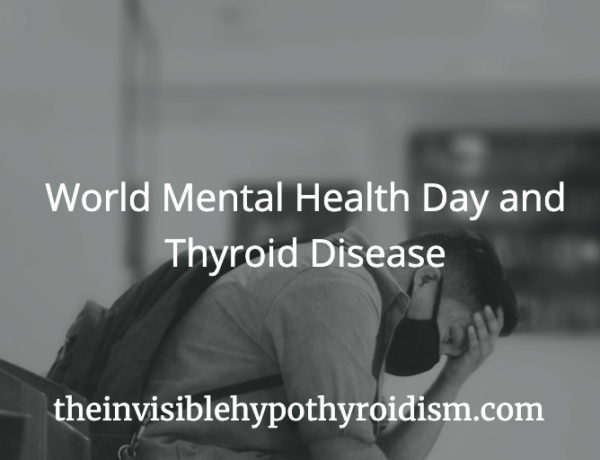Originally published on 28th March 2021 Last updated on 5th August 2024
Experiencing constipation with hypothyroidism is incredibly common, yet many of us are too embarrassed to talk about it and ask if it is ‘normal’.
Although it is a common symptom and many thyroid patients still experience it despite being on thyroid medication for their hypothyroidism, it isn’t normal to still be experiencing it and we don’t by any means just have to ‘put up with it’.
Regular bowel movements are crucial to good health, so constipation really shouldn’t be ignored.
What Causes Constipation With Hypothyroidism?
With low thyroid hormone (hypothyroidism), many of the body’s functions slow down, which can include the digestive tract. The muscles that contract to move stools through your intestine and to the rectum for release, depend on thyroid hormone. Without enough thyroid hormone, they can slow down immensely.
Other issues can also co-exist with hypothyroidism, such as poor gut health and vitamin and mineral deficiencies (mentioned below), which can contribute to poor bowel movements.
What Do Normal Bowel Movements Look Like?
Bowel movements should happen at least once if not twice daily. It takes thirty-six hours for food to pass through the colon. Stools are made up of bacteria and food debris.
You shouldn’t feel the need to strain, stools shouldn’t be hard or lumpy, painful to pass or take a long time to pass.
Before the age of twenty-five, I didn’t have experience of not being constipated. For as long as I could remember, even as a child, I had never gone to the toilet regularly and only passed a bowel movement once every one to two weeks. And even when I did, it was uncomfortable and not a healthy passing. I never felt the release of fully emptying my bowels.
Since addressing my bowel health and now thankfully having daily bowel movements (I’m not embarrassed to talk about this anymore because more of us need to talk about it), my health is a lottt better. And I realise just how bad it used to be.
The Consequences of Ignoring Poor Bowel Movements
- Haemorrhoids
- Rectal Prolapse
- Fissures or cuts in your bottom
- Missing a Colorectal Cancer diagnosis
When it comes to hormonal health, not emptying your bowels regularly also encourages issues such as poor gut health/Candida and possibly something called “oestrogen dominance” (a sex hormone imbalance).
Ways To Solve Constipation With Hypothyroidism
1. Optimise Thyroid Treatment
Optimising your thyroid hormone levels is key. The first step is checking what thyroid tests have been ran and ensuring that, if they haven’t already, Free T3 and Free T4 are checked. Many doctors only check TSH (Thyroid Stimulating Hormone) but this doesn’t give the full picture of your thyroid health (and isn’t even a thyroid hormone – it’s a pituitary hormone).
You can order full thyroid panels yourself from online laboratories too. UK lab here and US lab here.
Once you have these tested, checking that your Free T3 and T4 levels are optimised instead of just ‘within range’ is the next step. Optimal thyroid hormone levels can make all the difference and are much more specific and narrow than the standard wide ranges used.
Another benefit to checking your Free T3 if you’re on T4 medication such as Levothyroxine or Synthroid, is that it demonstrates whether you are converting your T4 meds to adequate amounts of T3. If you’re not, this can be contributing to constipation, among other ongoing thyroid symptoms.
2. Get Enough Fibre
Fibre – indigestible polysaccharide – is crucial for healthy bowel function. The body lacks enzymes to break fibre down, and although fibre has no nutritional value or calories, it improves blood lipids and decreases bad cholesterol (LDL). The fibrous structure sweeps toxins from unhealthy food, carcinogens and preservatives from intestines and helps to prevent colorectal cancer.
Eating enough fibre promotes healthy intestinal tract gut flora and regular passing of stools. Sources can include fruit, vegetables, bread, rice, pasta, oats, nuts, seeds etc.
3. Drink Enough Water
Drinking enough water helps to transport faeces and urine and prevents dehydration which can contribute to constipation. When your body is properly hydrated, less water is taken from the colon, which keeps your stools soft and easier to pass.
I use a BPA and BPS-Free water bottle and carry it with me everywhere; around the house (to remind me to stay hydrated all day), when I go out, on holiday etc. Bought a few years ago now, it’s lasted me really well and I have that added peace of mind that it’s not messing with my hormones or thyroid health as it’s BPA and BPS-Free.
Drinking warm water with half a lemon’s juice squeezed in can also help, as it helps to stimulate muscle lining the intestinal walls to contract and keep stools moving.
4. Consider Your Gut Health
The biggest thing to make a difference to my constipation, was working on my gut health with a functional medicine practitioner. We implemented digestive enzymes and probiotics which helped immensely and I saw results within days.
The ‘good bacteria’ found in probiotics help to properly digest your food and absorb nutrients from it too. Digestive enzymes help to break down protein, carbs and fat in your food and promote healthy digestion. Some people also use prebiotics, which are a type of fibre that the human body cannot digest, making them food for the probiotics.
However, always run any new supplements by your doctor.
5. Consider Vitamins and Minerals
My functional medicine practitioner also had me take magnesium citrate, which was another huge help.
Magnesium helps to relax muscles (which is why it can also help with muscle aches and pains). It can help to relax muscles in the digestive tract so that bowel movements can occur more easily.
Iron supplements can also cause constipation. Bisglycinate is a popular type of iron as it doesn’t cause stomach issues or constipation, so you may consider switching if this is a contributor.
6. Get Adequate Exercise
Many people with thyroid disease struggle to exercise, but even a gentle walk once a day can help when it comes to constipation, as it helps to get the intestines moving. Yoga and swimming can also be gentler forms of exercise for those living with a health condition. Certain yoga poses can be very good for digestive health.
7. Don’t Hold It in
When you need to go, go! Avoid holding in a bowel movement when you feel the need to go and let your body reestablish a routine for emptying its bowels.
Have you tried any of these ways to relieve constipation?
 See also:
See also:
The book Be Your Own Thyroid Advocate: When You’re Sick and Tired of Being Sick and Tired, which builds on this article. Reclaim your thyroid healthy life.


 See also:
See also:

